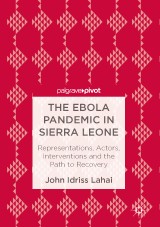Details

The Ebola Pandemic in Sierra Leone
Representations, Actors, Interventions and the Path to Recovery|
58,84 € |
|
| Verlag: | Palgrave Macmillan |
| Format: | |
| Veröffentl.: | 27.02.2017 |
| ISBN/EAN: | 9783319459042 |
| Sprache: | englisch |
Dieses eBook enthält ein Wasserzeichen.
Beschreibungen
<p>This book provides a timely examination of the Ebola pandemic in Sierra Leone from four different standpoints: 1) a social standpoint that focuses on the way in which the vulnerable Sierra Leonian population viewed the pandemic in light of their cultural beliefs, memories of past wars and narratives and actions of the government; 2) a good governance standpoint that exposes lapses in health governance and the general unpreparedness of the government and international community to deal with the outbreak; 3) a scientific research standpoint that looks at the role played by the Sierra Leone's Lassa Fever Research Laboratories as a main hub for the investigation, monitoring and evaluation of communicable diseases in the Mano River Union countries; and 4) an international politics standpoint that examines the development of a new bio-security international apparatus involving a wide range of international actors and institutions. </p><p><br></p>
1. Introduction<div><br></div><div><div>1.1 ‘What The Death of ‘Patient Zero’ Taught Us?’</div><div>1.2 Significance of the Book</div><div>1.3 Methodological Considerations</div><div>1.4 Structure of the Book</div><div><br></div></div><div>2. The Ebola Pandemic: Meaning, Origins, and the Pathways of Eruption and Spread</div><div><br></div><div><div>2.1 Meaning: What is Ebola?</div><div>2.2 Historical Origins: From The Congo to Sierra Leone</div><div>2.3 Ebola in Sierra Leone: The Social and Political Pathways of Eruption and Spread</div><div>2.3.1 The Lack of an Effective Health Sector</div><div>2.3.2 The Kenema Laboratory/Kenema Hospital</div><div>2.3.3 Corruption in the Public Health Sector</div><div>2.3.4 Cultural Belief Systems and Traditional Medical Alternatives</div><div>2.3.5 Migration and The Environment, and Their Health Consequences</div><div><br></div></div><div>3. Representations: Between Uncertainty, Epistemology, and Political Dominance</div><div><br></div><div>3.1 Local Representations<br></div><div><div>3.2 International Representations</div><div><br></div></div><div>4. Interventions: How Actors Mediated Between and Honored Humanitarian Action, Political Interests, and Medical Scientific Knowledge</div><div><br></div><div>4.1 The Government of Sierra Leone<br></div><div><div>4.2 The World Health Organisation </div><div>4.3 Mèdecins sans Frontierès</div><div>4.4 The United Nations Mission for Ebola Emergency Response (UNMEER)</div><div>4.5 The United States of America</div><div>4.6 Great Britain</div><div>4.7 Aspen Medical of Australia</div><div>4.8 China</div><div>4.9 Cuba</div><div><br></div></div><div>5. The Aftermath: The Proposed Pathway to Public Health Recovery 2015-2020</div><div><br></div><div>5.1 From the Abyss and on the Road to Recovery <br></div><div><div>5.2 Financing The Health Sector for an Effective Post-Ebola Public Health Sector governance</div><div><br></div></div><div>6. Conclusions</div>
<b>John Idriss Lahai </b>is an applied development studies scholar. He earned his PhD from the University of New England, Australia. Prior to joining Flinders University, Australia, as Visiting Research Fellow in the School of International Relations, he was an independent consultant with extensive experience working for think tanks and governments in Sub-Saharan Africa and elsewhere. He is editor of <i>African Frontiers: Insurgency, Governance and Peacebuilding in Postcolonial States</i> (2015) and author of <i>Gender in Practice: Culture, Politics and Society in Sierra Leone</i> (forthcoming).
<div>This book provides a timely examination of the Ebola pandemic in Sierra Leone from four different standpoints: 1) a social standpoint that focuses on the way in which the vulnerable Sierra Leonian population viewed the pandemic in light of their cultural beliefs, memories of past wars and narratives and actions of the government; 2) a good governance standpoint that exposes lapses in health governance and the general unpreparedness of the government and international community to deal with the outbreak; 3) a scientific research standpoint that looks at the role played by the Sierra Leone's Lassa Fever Research Laboratories as a main hub for the investigation, monitoring and evaluation of communicable diseases in the Mano River Union countries; and 4) an international politics standpoint that examines the development of a new bio-security international apparatus involving a wide range of international actors and institutions. <br></b></div><b><div><b><br></b></div>John Idriss Lahai </b>is an applied development studies scholar. He earned his PhD from the University of New England, Australia. Prior to joining Flinders University, Australia, as Visiting Research Fellow in the School of International Relations, he was an independent consultant with extensive experience working for think tanks and governments in Sub-Saharan Africa and elsewhere. He is editor of<i>African Frontiers: Insurgency, Governance and Peacebuilding in Postcolonial States</i>(2015) and author of <i>Gender in Practice: Culture, Politics and Society in Sierra Leone</i> (forthcoming).
<p>Presents a timely engagement with one of the worst pandemic outbreaks the international community has had to deal with in recent years</p><p>Features an interdisciplinary approach that appeals to scholars within the public health, security studies, international development and political and international studies communities</p><p>Focuses on the unique interplay between medical science, politics, national and international interests and financing for the health sector</p>


















